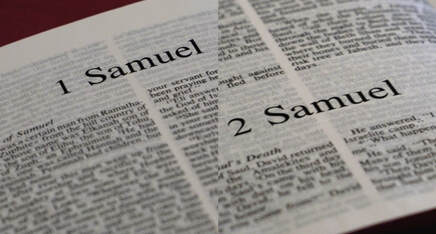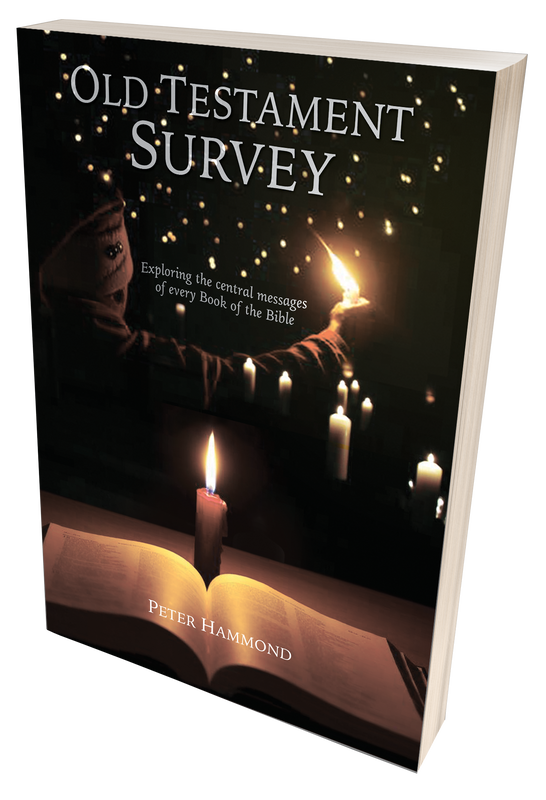
"Speak Lord, for your servant listens…" 1 Samuel 3:9
Leaders of Israel From 2000 to 1500 B.C. Israel was led by Patriarchs. From 1500 to 1000 B.C. they were led by Prophets. From 1000 to 500 B.C. they were led by Princes (or Kings). In the 500 years leading up to the time of Christ, they were led by Priests. Main Characters First Samuel begins with Hannah, the anxious wife, desperate to have a child, Eli, the ailing high priest, Israel the arrogant army, and Saul, the anointed king. The main characters in the first Book of Samuel are: Samuel - the last judge; Saul - the first king; David - the best king of Israel and Jonathan, the adventurous son of King Saul. Samuel, the prophet, pronounced God's judgement upon Saul, and anointed David as the future king. David, the steadfast shepherd, the skilled musician, the superb warrior, then the suspected courtier, the stalked outlaw, and the soldier in exile.
A Time of Transition
Royal history of Israel begins with the Book of Samuel. The long period of the rule of the Judges ends with Samuel. 1 Samuel begins the 500-year period of the Kings of Israel. Samuel Samuel, the last of the judges, was God's answer to the earnest prayers of his mother, Hannah. Received from the Lord, she consecrated him back to the Lord. Samuel was trained under Eli, who was both a judge and a high priest. Eli Eli had ruled Israel for 40 years. However, he was an indulgent father and a permissive priest, allowing his wicked sons, Hophni and Phinehas, who were also his priests, to behave in a most immoral and disgraceful manner. Young Samuel was given a Word from the Lord of judgement upon the house of Eli, because he had failed to deal with his sons and priests who were abusing their positions through immorality, dishonesty and blasphemy. Disaster Israel was invaded by the Philistines, their armies defeated, the Ark of the Covenant seized by the idol-worshipping Philistines and placed into the temple of Dagon, and Eli's sons were killed. Eli died of shock when he heard of these calamities. The Power of God The people of Israel learned that they could not manipulate God. The Ark of God was a poor substitute for the God of the Ark. It was not that God had deserted them, but they had deserted God. The Philistines soon learned that their idols were no match for the God of Israel. The huge idol of Dagon was found smashed face down in front of the Ark of the Covenant, in their own temple. As God afflicted the Philistines with a terrible plague, they surrendered the Ark back to Israel. Idols for Destruction Samuel the prophet called on the Israelites to repent and destroy their idols. Then he led them in battle against the Philistines. This time they were victorious. Whenever the Israelites disobeyed God an enemy was sent to defeat them. Whenever they repented and destroyed their idols, God enabled them to defeat their enemies. The Demand for a King As the Israelites demanded a king that they may be like the nations around them, God told Samuel to warn the people of the consequences: a king would want a palace and an army, so taxation and conscription would follow. When the Israelites persisted in demanding a king, Samuel gave them the kind of king the wanted: tall, handsome, strong and powerful in battle. Saul Saul proved a successful leader in battle, defeating the Philistines, the Amalakites and Ammonites. However, although he began well, he grew proud and presumptuous. Saul violated the separation between the role of a king and that of a priest. He presumed to offer the sacrifice at God's altar. Saul was disobedient when commanded to destroy King Agag and the Amalakites. Deteriorating Discernment Saul's relationships deteriorated, first with his adventurous son, Jonathan, whom he sentenced to death for disobeying some ridiculous instruction that his son was not even aware of. Only the firm action of his army prevented Saul from unjustly executing his own son. Disastrous Disobedience Saul's relationship with the prophet Samuel also deteriorated drastically. In response to Saul's repeated disobedience of the Commands of the Lord, Samuel declared: "To obey is better than sacrifice… for rebellion is as the sin of witchcraft and stubbornness is as iniquity and idolatry. Because you have rejected the Word of the Lord, He has also rejected you from being king." 1 Samuel 15:22-23. Ritual is no substitute for righteousness. Obedience is better than any religious sentiment. Disgraceful Defeat King Saul's relationship towards the young shepherd, David, who had boldly challenged the giant Goliath and defeated him in combat, poisoned the last years of Saul as king. Saul deteriorated morally and mentally. His jealousy and hatred of David twisted his final years as king and distracted him from his duties. Finally, King Saul descended to seeking out and enquiring of a witch at Endor. Ultimately King Saul died in disgrace and defeat, committing suicide on the field of battle, where three of his sons also died. Saul left his nation in defeat, divided and in disgrace. 1 Samuel focuses on man's choice as king - Saul. 2 Samuel focuses on God's choice for king – David. David David is the most versatile character in the Bible: a shepherd, a musician, a soldier, a writer of Psalms, a fugitive and outlaw, and the greatest King of Israel. David is one of the most prominent figures in the history of the world. There is more space given to the character of David than any other person in the Old Testament. He is described as "a man after God's own heart" (1 Samuel 13:14). He was athletic, a gifted musician, and his poetical skill was of the highest order. The Treasury of David The Psalms, the treasury of David, are the largest Book of the Bible, the middle Book of the Bible, the Prayer book and Hymn book of the Bible. Our Lord Jesus Christ quoted more from the Psalms than from any other Book in the Bible. Defeating Goliath David was the youngest of the eight sons of Jesse. The story of David and Goliath must be one of the best known in the Bible. It is the mis-match of the ages. Goliath of Gath was 9 feet, 6 inches tall. The head of his spear was 10kg. King Saul and all his soldiers were dismayed and terrified. Only young David, the shepherd boy, was willing to go down into the valley of the shadow of death and confront this giant. With no breastplate, but his shepherd's coat, no spear, but his staff, no sword or bow, but a sling, no quiver, but 5 smooth stones, David came in the Name of the Lord. David relied on the Lord, as Goliath relied on his sword and spear. David's victory over Goliath is a type of Christ's victory over satan. David epitomises our calling to be more than conquerors through Christ Jesus our Lord. Contrasting Kings Both Saul and David ruled as kings of Israel, both for 40 years. Yet Saul was a failure and David was a success. It was not that David was perfect, but he wholeheartedly confessed and repented of his sins and transgressions against the Lord. David displayed humility, faithfulness, patience, and courage. He repeatedly spared the life of his tormentor, Saul, refusing to assassinate God's anointed king. Saul, an unrepentant sinner, went to death and destruction, dragging his family and country with him. David refused to take the law into his owns hands. He trusted in God's timing. David, a repentant sinner, achieved glorious victories over his enemies. He left us some of the greatest songs of worship ever composed in history. Jerusalem After the death of Saul, David was made king of Judea, and 7 years later, king over all the 12 tribes of Israel. He conquered Jerusalem from the Jebusites and made it the new capital of the nation of Israel. Sincerity is Not Enough When he sought to bring the Ark of God into Jerusalem, it indicated a desire to put God at the centre of the political and cultural life of the nation. However, sincerity is not enough. Neither David, nor the priests, followed God's specific directions for how the Ark was to be transported. As a result, Uzzah was struck dead for reaching out and touching the Ark. Here we learn that it is not what we think, but what God says, that is important. The Ark was not to be transported on an oxcart, but carried on poles by priests. The Danger of Inactivity David also fell into sin by remaining in Jerusalem at a time when kings went out to war. Some temptations come to the industrious, but all temptations come to the idle. Although David's repentance was wholehearted and sincere (Psalm 51), the terrible episode of David and Bathsheba confirm the truth of Numbers 32:23, "be sure your sin will find you out", and "what a man sows that shall he reap". The baby died, David's son, Absolom treacherously sowed division and led the nation into civil war, and much death and destruction resulted. Beware when you think you stand, lest you fall. Parenthood and Personal Responsibility The books of Samuel also show us the importance of parenthood. Both Eli and Samuel failed to adequately discipline their children, and severe consequences resulted. Yet, one also learns the responsibility of individual choices. Although Jonathan was the son of a bad king (Saul), he was an exemplary soldier and a friend who stuck closer than a brother. Although Absolom was the son of a good king (David), he became selfish and treacherous. A Golden Age David took a single tribe, developed it into a settled nation and expanded it into a sizable empire. Although he inherited a divided and chaotic state, he lifted Israel to the heights of becoming the dominant military and political power in Western Asia. Preparations for the Temple David captured Jerusalem and established the capital of Israel there. He brought the Ark back to Jerusalem and made all the preparations necessary for the building of the Temple, which his son King Solomon would accomplish. When God sent a plague to judge the nation, David bought a threshing floor to establish an altar. It was on this very spot that the Temple was later built under his son, King Solomon. Livingstone Fellowship P.O. Box 74 Newlands 7725 Cape Town South Africa Tel: 021-689-4480 Fax: 021-685-5884 Email: [email protected] Website: www.livingstonefellowship.co.za
0 Comments
Leave a Reply. |
OLD
TESTAMENT SURVEY ARTICLES
All
ARCHIVES |


 RSS Feed
RSS Feed